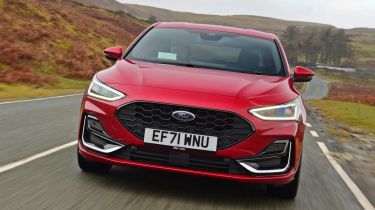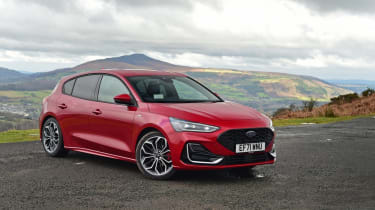Ford Focus review - MPG, running costs & CO2
The Ford Focus' running costs should be pleasingly low, helped by impressive fuel economy, but hybrid options wouldn’t go amiss
The Ford Focus has always been competitive rather than class-leading when it comes to fuel efficiency but ever-improving rivals forced the latest model to make a bit of a leap forward. Clever engine technology, weight reductions and sophisticated aerodynamics help to improve economy.
Notably, there are no full-hybrid or plug-in versions of the Focus. This omission is made more prominent by rivals such as the Toyota Corolla being offered as a hybrid, while the latest-generation models of the Peugeot 308 and Vauxhall Astra are now available with PHEV powertrains. Tax-conscious business users or buyers keen on electrification are best off looking elsewhere.
The popularity of the Ford Focus in the UK means it does have something of an image problem and rivals enjoy stronger residual values. But maintenance costs through the extensive Ford dealer network are reasonable.
| Model | Fuel Economy | CO2 |
|---|---|---|
| 1.0 Ecoboost petrol 123bhp | 47.1-52.3mpg | 121 - 135g/km |
| 1.0 Ecoboost petrol 153bhp mHEV | 51.4 - 54.3mpg | 116 - 124g/km |
| 2.3 Ecoboost petrol 276bhp | 35.3mpg | 183g/km |
This fourth-generation Focus added mild hybrid (mHEV) tech and cylinder deactivation on the 1.0-litre Ecoboost petrol engine, with Ford claiming that cylinder deactivation tech had never appeared on a three-cylinder engine before.
The manual 123bhp mild-hybrid 1.0-litre Focus returns a WLTP fuel economy figure of up to 54.3mpg. The 153bhp version is now solely available as an automatic, and fuel economy is slightly worse than the discontinued manual version with the same engine, at up to 53.3mpg.
More reviews
Predictably, the Focus ST hot hatch delivers the model’s worst fuel economy figures with its 2.3-litre Ecoboost engine, at up to 35.3mpg for both the manual and the automatic. The 1.5-litre diesel has been discontinued, but had an official fuel economy figure of around 57mpg, which isn’t miles better than the 1.0-litre petrol models.
Across the range, returns are very competitive for the class and, the ST model aside, there isn’t a huge difference between the efficiency and emissions of any Ford Focus. It means that performance and price become bigger factors in making your engine and gearbox selection.
Reasonable CO2 emissions make for a low Benefit-in-Kind (BiK) tax rating for company-car users but the big savings on company car tax are only available with electric or plug-in hybrid models - something that the Focus can’t offer.
Insurance
The Focus ranges from insurance group 13 (out of 50) for the entry-level Titanium models, increasing to group 17 for an ST-Line trim fitted with the more powerful 1.0-litre EcoBoost petrol engine. The ST is the highest of the range in group 27. The Focus insurance groups are slightly lower than those for the Volkswagen Golf and on a par with the Kia Ceed.
Which Is Best?
Cheapest
- Name1.0 EcoBoost Hybrid mHEV ST-Line 5dr
- Gearbox typeManual
- RRP£29,330
Most Economical
- Name1.0 EcoBoost Hybrid mHEV ST-Line 5dr
- Gearbox typeManual
- RRP£29,330
Fastest
- Name1.0 EcoBoost Hybrid mHEV 155 ST-Line 5dr Auto
- Gearbox typeAuto
- RRP£31,180










